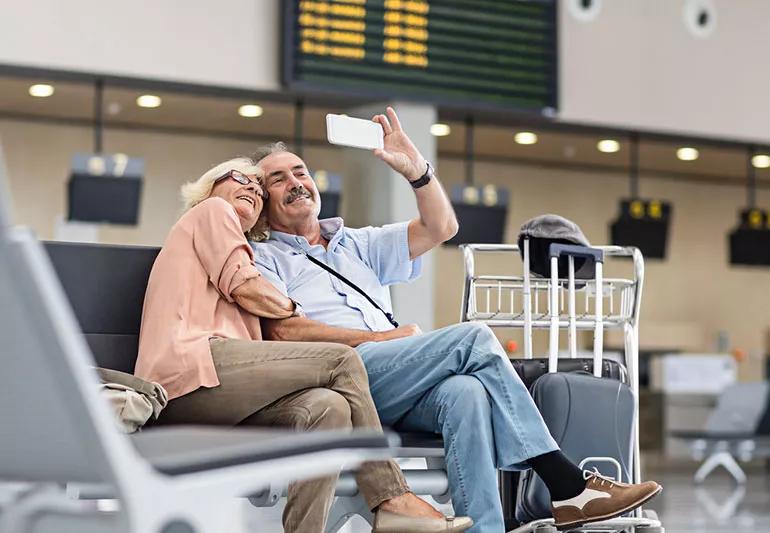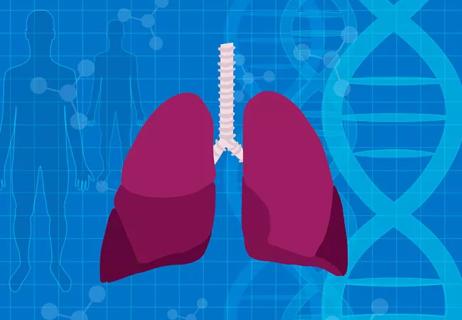Here how to do it safely

Pulmonologist Neal Chaisson, MD, believes travel can help patients with pulmonary hypertension continue to live a full life.
Advertisement
Cleveland Clinic is a non-profit academic medical center. Advertising on our site helps support our mission. We do not endorse non-Cleveland Clinic products or services. Policy
“I take working with patients to make sure we can keep travel in the cards very seriously,” Dr. Chaisson says.
Patients and their families have a critical role, too, in planning ahead to make travel as safe as possible. A person with pulmonary hypertension has high blood pressure in their lungs, causing their blood vessels to narrow and their heart to work harder.
That means they may need medication to widen their lungs’ blood vessels, ease the burden on their heart or reduce their symptoms in other ways. In some cases, patients with pulmonary hypertension need oxygen, too.
Staying safe while traveling is mostly about continuing to take your medication or oxygen therapy during your trip. And part of knowing how to travel safely is knowing when to stay home.
Most patients, though, can travel safely with these tips from Dr. Chaisson.
Medicine that treats pulmonary hypertension helps blood vessels relax, expand and pump blood. In people whose pulmonary hypertension isn’t severe, oral medications are often enough to control the disease.
“There’s virtually no problem with these patients traveling on a cruise, by air or even overseas,” Dr. Chaisson says. He has a few suggestions to be prepared:
Advertisement
People whose pulmonary hypertension is more advanced may need intravenous (IV) or subcutaneous (continuously delivered under the skin) medication delivered by a continuous infusion pump. This requires precautions to prevent problems with the pump during travel.
If you are on IV or injectable medications for pulmonary hypertension, coordinate your travel with your airline or cruise ship. These companies are used to helping patients with medical needs, Dr. Chaisson says.
Keeping a catheter working in a remote or foreign country can be another challenge.
“In my experience, the times people get in trouble are when they get hospitalized and the nurse or physician is unfamiliar with pulmonary hypertension,” he says. “I have had several instances where patients ran into a problem with the pump or infusion and their medicine was not restarted at the local hospital,” he says.
To prevent this, keep your doctor’s contact information ready so they can walk your caregivers through dealing with any problems that might arise with your infusion medication.
In addition, tell your doctor before you travel so they can provide you with off-hours contact information and help you plan.
As a last resort, contacting your specialty pharmacy in an emergency is an option as nurses at these pharmacies can often assist physicians with questions regarding pulmonary hypertension medications.
Patients with severe pulmonary hypertension may need portable oxygen because they have a weakened heart that has trouble delivering oxygen to the rest of the body. Their travel requires some of the most creativity.
Air travel adds another hurdle. A plane at cruising altitude is pressurized at oxygen levels equal to about 8,000 feet above sea level. This means that people who breathe easily at home may struggle in a plane or at destinations at higher altitudes.
Since the lung’s blood vessels tend to tighten when there isn’t as much oxygen in the environment, “It’s a little bit of a one-two punch,” Dr. Chaisson says.
To see if a patient’s lungs are strong enough to handle air travel, doctors will often perform an oxygen stress test. Patients’ blood oxygen levels will be monitored as they breathe air similar to what they’ll experience on a plane or at altitude.
If needed, patients may be allowed to take portable oxygen onto the plane. When they are at home, patients who take oxygen therapy use a machine called an oxygen concentrator. These devices, which take oxygen from the air and deliver it to the patient in concentrated form, are available for rent in portable form.
Whether you’re taking them on the road or in the air, there are a few things to note about these portable concentrators:
Advertisement
In these cases, a doctor will have to certify that you’re healthy enough to travel. (Airlines are trying to avoid emergency landings to treat sick flyers.)
“In some cases, when a patient just needs too much oxygen and there’s no way to get around it, it’s just not feasible,” Dr. Chaisson says.
But usually, with some coordination between your doctor and your airline or cruise ship, pulmonary hypertension doesn’t mean you have to stay home.
Advertisement

Sign up for our Health Essentials emails for expert guidance on nutrition, fitness, sleep, skin care and more.
Learn more about our editorial process.
Advertisement

Keep your eyes peeled for sneaky sources of sodium

A rare gene mutation may increase your risk for the disorder

‘Walking pneumonia’ is milder and doesn’t always require medication — but it’s also highly contagious

Wearing a scarf, adjusting your outdoor activities and following your asthma treatment plan can help limit breathing problems

Vaping exposes you to thousands of chemicals, including many that are known to cause cancer and lung disease

Diaphragmatic breathing, pursed lip breathing and huff coughing can help manage COPD symptoms, like chest congestion and shortness of breath

Making a health plan with your doctor before you leave will make it easier to sit back and enjoy your flight

Adult-onset asthma has the same symptoms as childhood asthma, but tends to be more severe

Even small moments of time outdoors can help reduce stress, boost mood and restore a sense of calm

A correct prescription helps your eyes see clearly — but as natural changes occur, you may need stronger or different eyeglasses

Both are medical emergencies, but they are very distinct events with different causes